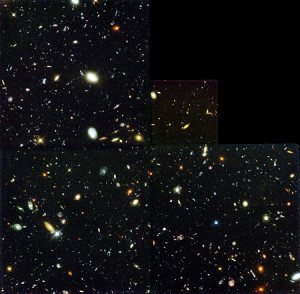It’s a slight argument, one that might seem not to amount to much, plus quite abstract. But I have a feeling that inside it, trying to get out, is something quite extraordinary.
One. The universe of things is contingent–it may or may not be. All the evidence points against anything eternal in it. Another, empirical, way of saying the same thing is that the energy of the universe is finite and so, ultimately, it will be reduced to entropy and dust. (To posit a multi-verse is to create a regression; that too must eventually end in exhaustion.) If this is the universe’s nature and destiny we have no explanation or reason for its existence in the first place.
Two. On the other hand, if we cannot explain the universe and nevertheless it is, its factual being provides an example of something we cannot explain and yet is. As far as we are concerned, therefore, it is equally possible that there is an eternal living creator whose existence we cannot explain. (Note that this is not an argument for a god as first cause of the world, but of the possibility of such a being.)
In other words, all things are equally im/possible (possible not to be) and possible–as far as we are concerned!
Three. At the same, this kind of philosophical discussion about the possibility of a divine creator has little or no bearing on the traditional anthropological function of a god. According to Rene’ Girard the origin of the god is nothing to do with abstract possibilities, it is rather the sacred vessel of the group’s violence, the ur-symbol of primitive human order. The philosophical questions about the existence of God are in many ways a result of the loss of trust in these primitive mechanisms under the influence of the gospels (Girard’s argument of cultural influence).
Girard allows us, therefore, to approach these traditional questions in a new way. Letting go of violence at the source of human meaning allows us to fill the universe with a new possible meaning.
Four. Jesus is the paradigm for human being who rendered the possibility of the creator into the possibility of love. He took the ancient signifier “god” and filled it with love. He said, “Yes, there is a Creator God. He is my Father, a God of Love.”
Through his teaching, life, death and resurrection he translated the figure of God into love. He anchors the universe in love. The testimony of Jesus’ resurrection is an affirmation of this transcendent change in his followers. Whatever we think of the resurrection–physical event, emotional event, constructed event–there is no doubt that Jesus’ revolution of love became part of the very fabric of being for his followers and progressively part of the universal history it helped create.
Five. To embrace Jesus’ translation of the im/possibility of God, turning it irrevocably into love, is to take responsibility for a contingent universe and existence, placing our bets on love. We have no way of knowing how this will turn out, but it seems the most responsibly human thing to do. Through love we not only answer the conundrum of existence but we give love a throne which at a profound experiential level it already has: the one true thing which is eternal.
Tony
Can we get in touch ?
Please email me to check up with me about the shared vision & courage you have that I was allowed in to see by the holy spirit last year (2015) on Pentecost.
Hi Luke, I am sorry I just got around to replying. I am preparing for a conference, and I always get a little discombobulated at such times. Thanks for your more recent note and comment about Virtually Christian. I have not studied Hildegard in detail, but yes I could have referenced her at that point. As you say, she has an epic voice and it is perhaps only now coming into its own. Blessings on you for your own journey, and, yes, I would love to get in touch and hear about your Pentecost last year. My email is: tonywbartlett@gmail.com. Peace and love of God to you, Tony Bartlett
Luke, my email is tonywbartlett@gmail.com. I would love to talk in more detail. I also replied to your more recent note on the site. Blessings of peace, Tony
This is great, we should have discussion groups along philosophical lines, led of course by our resident philosophical, theological, teacher, tony Bartlett
Great, a new beginning from an infinite God, that basis is love not violence, however I . am having trouble with point 3. I vote for an infinite God, beyond our need to construct a God out of violence. Maybe you could lead us in more thoughts along this line.
Hi Carola, great that you were reading the blog! 🙂 Re. your question, we live in the era of the “death of God” (first articulated by Nietzsche in 19th century). This means that the traditional anthropological and conceptual space of “God” has eroded if not disappeared quite altogether. But this is not a disaster from a Christian point of view. Arguably, it is the impact of Christianity itself that has done this. Demystifying the sacred/making the ordinary human the space of divine presence. This means that we are searching out the infinite G-d in a transformed human space, not in the old “God-above” supernaturalism and/or Greek prime mover sense. We have no idea of how G-d might cause the world, or in what “dimension” the eternal G-d might live. What we do know is that G-d is committed to a transformed human space, which is experienced as love. G-d disappears from the sky and emerges in the depth of our human experience. Really there, not absent, truly present!
Thanks tony, “a transformed human space, ” love begets love, I get that, but knowing myself, I trust on a transcendent, transforming God to shore up my humaneness.
Thanks, Annett Santora for hopeintime.com